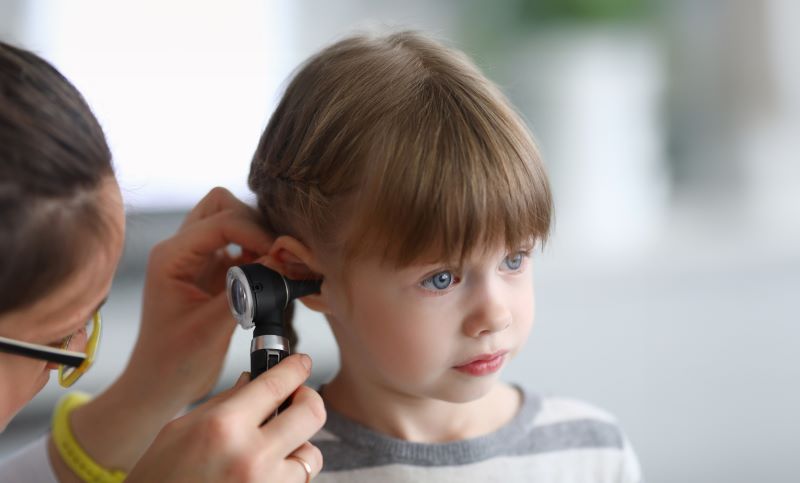|
www.HealthyHearing.com |
5 common causes of temporary hearing loss
Contributed by Debbie Clason, staff writer, Healthy Hearing Many different things can cause temporary hearing loss, ranging from impacted earwax to infections to noise damage. In most cases, the hearing loss is mild and will go away quickly. However, persistent or severe hearing loss that develops suddenly should always be investigated by a physician. Here are the most common causes of temporary hearing loss, and the treatments for each: Five common causes of temporary hearing loss1. Middle ear infections
in children and adults. When the area behind the eardrum is invaded by bacteria-filled fluid, an infection is very likely to develop. Because the middle ear contains a passageway to the back of the throat, ear infections can develop from a nasty cold or virus. These infections are common in children and could affect their ability to hear temporarily. They usually only affect one ear. An infection in the middle ear can cause a build-up of fluids when the body is trying to fight the infection. These fluids can put pressure on the structures of the ear that are used in hearing, such as the middle ear bones. In some cases, these fluids cause so much pressure that the eardrum can rupture and leak blood and pus-like fluids from the ear. A ruptured ear drum can be painful, but it can often repair itself once the infection has cleared. Treating middle ear infectionsTreatment for ear infections is typically a course of antibiotics. If you are prescribed antibiotics for an ear infection, don't stop taking them just because you feel better. Continue taking the medication until it is gone to ensure you've wiped out the infection completely. 2. Exposure to loud noiseExtremely loud noises—like the kind found at the front-row of a concert, or at the shooting range (with no ear protection)—can cause temporary hearing loss. This kind is known as temporary threshold shift. How does this happen? Deep inside our inner ears, tiny hair cells detect sound waves and transmit these signals to the brain. These hair cells can be damaged by noise. It usually affects both ears, but can be more severe on the side that received more noise (such as from a gunblast while you held a gun, known as "shooter's ear"). It doesn't generally cause pain. When the hearing loss is permanent, this is known as noise-induced hearing loss. Treating loud noise exposure or 'concert deafness'Concert deafness is a bad sign—your ears have been damaged. If this sounds like what has happened to you, rest your ears as soon as you can. Do not expose yourself to more loud sounds if at all possible. While your hearing will likely recover in the short-term, you may have caused some long-term damage to the delicate hair cells in your ears. If your hearing doesn't get better within a day or so, seek medical help. And don't forget that the next time you find yourself in a loud setting, you must protect your hearing from further damage by wearing ear protection. If you know you’ll be attending a loud concert or fireworks display, wear earplugs or earmuffs. If your hobbies include using loud equipment such as live music, motorcycles, snowmobiles or firearms, always wear protective hearing gear. Muffled hearing and ringing in the ears, often called tinnitus, also generally results from high noise exposure. Turn down the volume or wear protective ear equipment to reduce the chance of developing permanent hearing loss and lifelong tinnitus. 3. Accumulation of earwax or impacted earwaxBelieve it or not, earwax is a good thing–most of the time. Its job is to trap dust and other small particles before they reach the eardrum. As a general rule, earwax falls out of your ear canal naturally, but there are times when the wax becomes impacted or stuck in the ear canal. This blockage of impacted earwax can cause sudden loss of hearing in one or both ears, hindering the ability of sound waves to travel through the ear canal to the ear drum. When the eardrum is unable to function properly, hearing can be negatively affected. It can affect one or both ears and doesn't generally cause pain. Treating impacted earwaxVisit a healthcare provider who can easily flush or remove the wax from the ear canal. For many people, the procedure is quick and fairly painless. Whatever you do, do not insert a cotton swab in your ear. 4. Swimmer's ear
reduce the chance of swimmer's ear. If you’ve recently been swimming and are experiencing itchy ears, pain or a feeling of fullness in your ears, you may have a case of swimmer’s ear, known as an outer ear infection. This infection in your outer ear canal usually occurs when water remains in your ear after you’ve been swimming. It can affect one or both ears and be incredibly painful. Did you scratch your ears and now can't hear? Despite the name, swimmer's ear also can be caused by scratches or abrasions in your ear canal caused by using cotton swabs, hairpins or your finger to clean your ear canal. Treating swimmer's earAntibiotic drops are usually prescribed. When this condition is properly treated by a medical professional, your hearing typically returns to normal. Also, prevent future problems by making sure you always get rid of water trapped in your ears. 5. Medication side effectsMany drugs are known to cause hearing loss, including common ones like aspirin. This is known as ototoxicity. If you develop any new changes in hearing after starting a medication, always let your doctor know. Treating drug side effectsTreatment may include switching medications. Most of the time this type of hearing loss is temporary, but in some cases—especially when an alternative medication isn't available for a life-threatening condition—the loss may be permanent. Follow your doctor's guidance about what to do. Temporary hearing loss in childrenMany of the same things can cause temporary hearing loss in children. However, especially for younger kids and babies, the signs and symptoms can be a little different. Read more about temporary hearing loss in kids. Medical emergency: Sudden severe hearing loss in one earCan't suddenly hear out of your left or right ear? Sudden hearing loss without a clear origin (you didn't recently attend a loud concert or swim in a dirty lake, for example) is a medical emergency and should be treated promptly. Trust your gut: If something doesn't "sound" right or feels funny beyond a normal stuffed-up head, get to the doctor. The faster you get treatment, the better chance you have to regain your hearing. If you've been sick lately, this is important to tell your doctor, too—viral infections, including mumps and even COVID, have been linked to sudden hearing loss and tinnitus.
Some conditions may require advanced testing, so after seeing a hearing care provider or doctor you may need to schedule a follow-up appointment or visit a specialized physician known as an otolaryngologist (ENT). What about clogged ears?If you still have your hearing, but everything sounds mildly "muffled" or clogged, you may be wondering if it's one ot the causes above. It might be, but other things can cause clogged ears, too. Learn more about why your ears feel clogged or muffled. Debbie Clason, staff writer, Healthy Hearing
|
Featured clinics near me
Earzlink Hearing Care - Reynoldsburg
7668 Slate Ridge Blvd
Reynoldsburg, OH 43068

Find a clinic
Need a hearing test but not sure which clinic to choose?
Call 1-877-872-7165 for help setting up a hearing test appointment.


 Debbie Clason holds a master's degree from Indiana University. Her impressive client list includes financial institutions, real estate developers, physicians, pharmacists and nonprofit organizations.
Debbie Clason holds a master's degree from Indiana University. Her impressive client list includes financial institutions, real estate developers, physicians, pharmacists and nonprofit organizations.